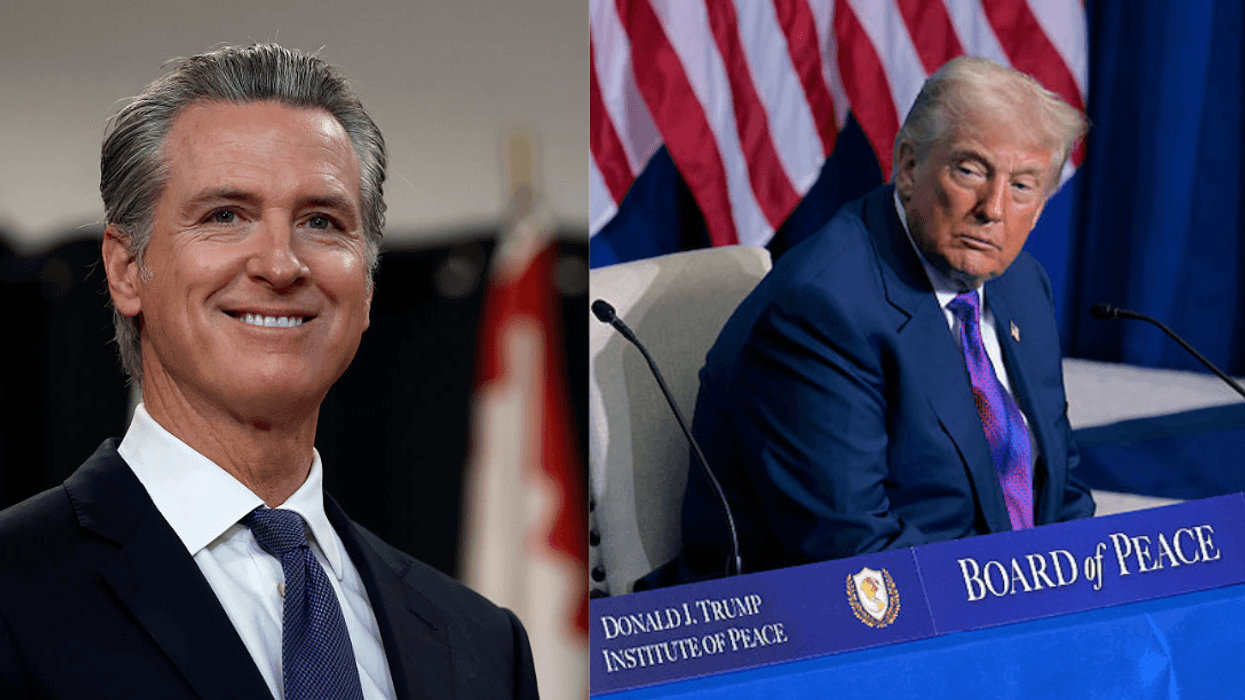Sean Spicer, the former White House press secretary, has been busy as of late. With the release of his book, The Briefing, he's embarked on a tour that's seen him jump from media outlets to comedy shows in what at least one outlet called "an effort at image rehabilitation."
Spicer, in contrast to many previous members of President Donald Trump's administration, has, at times, apologized for the outright lies he told on camera during daily press briefings and for his combative––infamously parodied––behavior with members of the media. The press has often tolerated these appearances, seemed deferential, and even congratulated Spicer for appearing to accept some degree of responsibility for stoking the flames of a culture that has grown nearly numb to the president's daily cries of "fake news!" at news outlets that print anything critical of him or his administration.
And Spicer, for all his apologies and justifications, did not expect to be challenged so mightily by BBC journalist Emily Maitlis during an interview for which he'd made a video appearance. Maitlis excoriated Spicer for the starring role he's played in the denigration of civil discourse.
"You joked about it when you presented the Emmy awards, but it wasn't a joke," Maitlis said, referring to Spicer's defense of Trump's claims that the crowds at his inauguration were the largest of any inauguration in history. "It was the start of the most corrosive culture. You played with the truth, you led us down a dangerous path; you have corrupted discourse for the entire world by going along with these lies."
"With all due––I'm sorry, Emily, you act as though everything began and ended with that," Spicer retorted. "You're taking no accountability for the many false narratives and false stories that the media perpetrated––"
"He [Donald Trump] shouts 'fake news' when he doesn't like something," Maitlis said, cutting him off.
"I can't sit here––I-I wrote a book that I think is fairly strong representation of what happened in the campaign, and the transition in the White House," Spicer said. "I take responsibility for where I think I've fallen short or where I could have done better. But for you to lay that kind of claim and make everything sound like it started and ended with Donald Trump is just absolutely ridiculous."
"I just-I guess my question," Maitlis said, "is you were his press secretary and I know from what I've read that you care about the freedoms and institutions and the democracy––"
"I do!" Spicer rebutted.
"––on which your country was built, and this is the office of the president spouting lies or half-truths or knocking down real truth and you were his agent for those months."
"My job, as I lay out in the book, was to be the president's spokesperson and communicate his thoughts and his ideas when he wasn't able to do it or wasn't present," Spicer said. "That's my job. My job wasn't to interpret for him. I gave him the best advice and counsel I could in private. I shared with him what I thought strategy would be. But at the end of the day, he is the president of the United States, and it was his thoughts and his ideas––"
"Okay."
"––and his feelings that it was my job to communicate. Whether you like them or not, those were his thoughts and his feelings."
"Let me talk about his feelings a little bit," Maitlis responded, "because you describe very well the day that the Access Hollywood story broke and the Republican candidate on that tape was talking about grabbing women by the pussy. Did that tell you anything about your man that you didn't previously know?"
There was a beat when Spicer was silent.
Then: "Well, I think we've all said things in private––which that was––that are inappropriate or incredible," he began.
"Have you said things like that?" Maitlis asked.
Spicer stumbled for a second before saying, "I don't know that I would want every single thing that I've ever said in private to be made public, no. I've probably said things that I regret, absolutely."
Many praised Maitlis for her conduct and criticized Spicer for failing to atone for his errors.
Spicer's tenure began when he lied about the size of the crowd at President Trump's inauguration, and Maitlis called him out on that before the segment of the interview seen above.
Spicer admitted he “screwed up” and wished he could have a “do-over,” but accused the media of "constantly undermining" the Trump campaign before the 2016 presidential election.
“It’s just not good enough,” Maitlis said. “Donald Trump, as you well know, made stuff up long before he was a candidate.”
Maitlis pointed to the part Trump played in spreading "birther" conspiracy theories which assert that former President Barack Obama was not born in the United States despite incontrovertible evidence to the contrary. She also noted Trump's previous statements calling climate change a "hoax" perpetrated by the Chinese.
The complete interview is below:







 The Benny Show
The Benny Show





 @neilforreal/Bluesky
@neilforreal/Bluesky @savannahcat/Bluesky
@savannahcat/Bluesky @qadishtujessica.inanna.app
@qadishtujessica.inanna.app @v-ron/Bluesky
@v-ron/Bluesky @nelnelnellie/Bluesky
@nelnelnellie/Bluesky @beatlenumber9/Bluesky
@beatlenumber9/Bluesky @pinkzombierose/Bluesky
@pinkzombierose/Bluesky
 @theunobsolete/TikTok
@theunobsolete/TikTok @theunobsolete/TikTok
@theunobsolete/TikTok @theunobsolete/TikTok
@theunobsolete/TikTok @theunobsolete/TikTok
@theunobsolete/TikTok @theunobsolete/TikTok
@theunobsolete/TikTok @theunobsolete/TikTok
@theunobsolete/TikTok @theunobsolete/TikTok
@theunobsolete/TikTok @theunobsolete/TikTok
@theunobsolete/TikTok @theunobsolete/TikTok
@theunobsolete/TikTok @theunobsolete/TikTok
@theunobsolete/TikTok @theunobsolete/TikTok
@theunobsolete/TikTok @theunobsolete/TikTok
@theunobsolete/TikTok @theunobsolete/TikTok
@theunobsolete/TikTok @theunobsolete/TikTok
@theunobsolete/TikTok @theunobsolete/TikTok
@theunobsolete/TikTok @theunobsolete/TikTok
@theunobsolete/TikTok @theunobsolete/TikTok
@theunobsolete/TikTok
 @laysuperstar/TikTok
@laysuperstar/TikTok @laysuperstar/TikTok
@laysuperstar/TikTok @laysuperstar/TikTok
@laysuperstar/TikTok @laysuperstar/TikTok
@laysuperstar/TikTok @laysuperstar/TikTok
@laysuperstar/TikTok @laysuperstar/TikTok
@laysuperstar/TikTok @laysuperstar/TikTok
@laysuperstar/TikTok @laysuperstar/TikTok
@laysuperstar/TikTok @laysuperstar/TikTok
@laysuperstar/TikTok @laysuperstar/TikTok
@laysuperstar/TikTok @laysuperstar/TikTok
@laysuperstar/TikTok @laysuperstar/TikTok
@laysuperstar/TikTok @laysuperstar/TikTok
@laysuperstar/TikTok @laysuperstar/TikTok
@laysuperstar/TikTok @laysuperstar/TikTok
@laysuperstar/TikTok